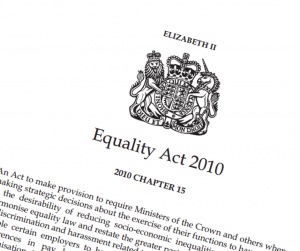What hotel practices, Jeremy Vine and Gordon Ramsey have in common
 Last weekend, an experience I had in a hotel caused me to reflect on the relationship of social practices to the principles and ethos behind the development of the UK Equality Act 2010. Staff, at the hotel I stayed at, had put an open top jug of cow’s milk, unnecessarily, on every table in the large breakfast room. To me, this was a sign of the way the dairy industry has a hold over consumers. Along with being duped into buying and using more and more cow’s milk, the public has also been conditioned to accept the dairy industry’s message that drinking cow’s milk is necessary and even an essential daily practice, so much so that in the hotel in question, it now takes its place alongside the salt and pepper pots in the middle of the table. Such has been the power of the dairy industry: the sight of a jug of cow’s milk on every table is not alarming to the majority and does not necessarily represent oppression, violence, abuse and exploitation of other life.
Last weekend, an experience I had in a hotel caused me to reflect on the relationship of social practices to the principles and ethos behind the development of the UK Equality Act 2010. Staff, at the hotel I stayed at, had put an open top jug of cow’s milk, unnecessarily, on every table in the large breakfast room. To me, this was a sign of the way the dairy industry has a hold over consumers. Along with being duped into buying and using more and more cow’s milk, the public has also been conditioned to accept the dairy industry’s message that drinking cow’s milk is necessary and even an essential daily practice, so much so that in the hotel in question, it now takes its place alongside the salt and pepper pots in the middle of the table. Such has been the power of the dairy industry: the sight of a jug of cow’s milk on every table is not alarming to the majority and does not necessarily represent oppression, violence, abuse and exploitation of other life.
For vegans, the practice can amount to a feeling of exclusion. In these circumstances, the ‘outsider’ feeling can be prominent. A vegan can become acutely aware of their difference and the popular perception that they object to the most ‘normal’ and ‘traditional’ of every day practices. The effect of a practice such as putting a jug of milk on every table is marginalisation. The message is “we all drink cow’s milk, it is a normal and an everyday part of life, we are all the same and you are different”. It is a very unwelcoming and unhelpful message to vegans, transitioning vegans and parents with young children.
Let’s think about this from a different perspective, a different group of people and a different practice that may cause marginalisation. For example, would a hotel, open to all, with legal duties to have due regard to people of all backgrounds and aiming to be respectful to all, place a glass of alcohol on every table? Wouldn’t this message say to those who may be offended “you are in a dominant culture and your ethics and views are unimportant and discounted”?
Of course, I am not saying that a hotel should not serve alcohol. I am saying that the existence of it and its presence should not be imposed on people. People who are offended by alcohol don’t have to visit the bar and can eat their meal without constantly being reminded that alcohol is present. Of course, it is a simple task for vegans to remove the jug of milk, but this does not address the inclusion and equality principles at stake.

Source: Derby City Council
The UK Equality Act 2010 was promoted as an Act to tackle inequality and marginalisation. It is legislation that reflects the idea that everyone has a duty to be inclusive and respective of the ethical convictions people live by. It is an Act to discourage marginalisation and encourage inclusion from the ‘ground up’. Providers of goods and services are not exempt from a general duty to be inclusive, and in these times of rapidly escalating numbers of people who attest their ethical opening by adopting veganism, providers of goods and services would do well to consider how their policies and practices include and accommodate vegans and how they may cause offence and marginalisation.
Some may respond “ah yes, but don’t vegans also have to respect the beliefs of those who do drink cow’s milk?” Firstly, vegans do not have to respect that view to the point of having that product imposed on them on their tables. It is doubtful that such a practice could be justified objectively. But more importantly, veganism comes within the scope of protection of the European Convention on Human Rights because it is cogent and serious. Beliefs that come within the scope of protection are regarded to be important, worthy of respect in a democracy, have significance to human life and behaviour and reflect the integrity of the person.
A belief that includes the practice of drinking milk, beyond infancy and that of another species, has not come before the court. If it ever does, in what ways will it be argued to be cogent, serious, reflecting the integrity of the person and a serious and weighty aspect of life that is important to a democracy? The only reason this practice exists is because the cows are ‘property’, not because there is any objective, moral, justifiable excuse or need that could qualify in the category of protection for sincere, ethical convictions. We only need to look at the 1960s Brambell Report to see the cruelty of the dairy industry cited in an official context.

Pictured: Jeremy Vine.
Photo credit: MEGA
The practice of the hotel in question typifies wider ignorance and marginalisation of vegans. Isn’t this why BBC Radio 2 presenter Jeremy Vine recently got into trouble with his sandwich? Barbara Ellen of The Guardian was right to point out that Joey “Carbstrong” Armstrong was “standing up for something he believed in” when he made the point that the content of Jeremy’s sandwich was offensive to him. Jeremy Vine had no regard for the ethical convictions of his interviewee, nor the fact that law protects people with deep convictions, nor that the Court has looked favourably on veganism. If Jeremy Vine was interviewing someone with a religious aversion to alcohol, would he have any on his desk? The same is true of Gordon Ramsey’s latest ‘provocation’, to which PETA have been forced to counter a very unpleasant attack on its acronym. What would happen if someone did the same for a religious acronym? What would happen in a school if a pupil offended another pupil this way?
Vegans are tolerant, we can take a joke and we even make some ourselves! But the point is that we also hold deep and sincere convictions about the wrongful exploitation of sentient beings. These convictions guide our daily lives; they are character forming and define who we are. Our convictions have the support of human rights principles and provisions, including legal equality measures which convey responsibilities and obligations to the domain of the majority. The principle of non-discrimination behind equality law does not only target outright and obvious discrimination. It also exists to deal with the intended and, sometimes, inadvertent and unintentional marginalisation of minorities.
Afterword:
During my ‘chat’ about the suffering of cows with hotel staff, I was informed that the open top jugs of cow’s milk are collected, later in the day, from all the tables and the chef uses what remains in the jugs to prepare hotel meals and drinks. Needless to say, that practice also raised an eyebrow or two!

